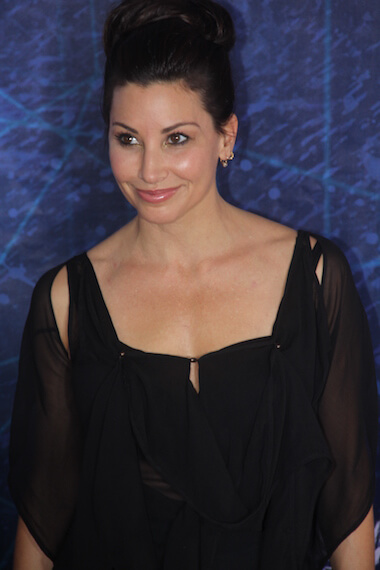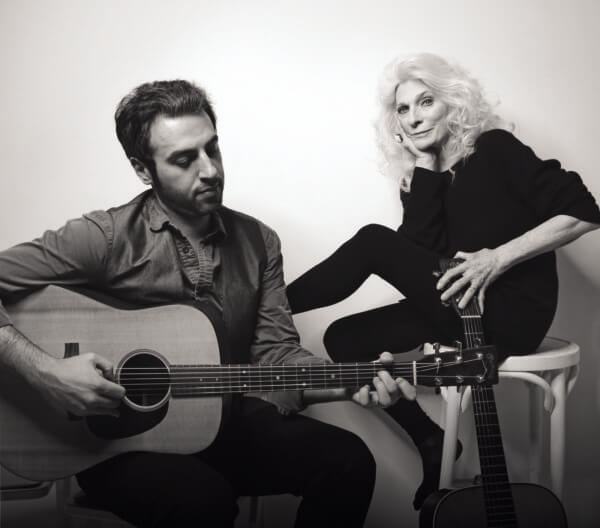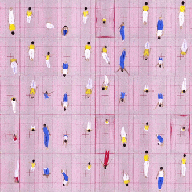Ute Lemper with her 12-year-old son Julian in their Upper West Side home. | DAVID NOH
The minute I heard Ute Lemper’s new show at the Café Carlyle was about Marlene Dietrich, I knew I had to talk to her. For me, that German superstar could very well be the most important woman of the last century. Her life spanned nearly all of it and took her in so many directions, to so many worlds: two World Wars, the latter of which saw her playing an important role, as an entertainer who performed near the front lines, imperiling herself, having refused offers to return to Germany to become a Nazi movie star. Her films spanned the silent and sound eras, and she worked with the finest movie talents of her day.
Her close friendships included so many celebrated names, from Ernest Hemingway, Erich Maria Remarque, Jean Gabin, and Jean Cocteau to Edith Piaf, Burt Bacharach, and the Beatles. And, finally, she remains vital because of the revolutionary, deeply influential way in which she lived her life, setting styles, defying convention, and going through it more as a man than a woman, with an open marriage to one guy all her life, numerous love affairs with both sexes, wearing masculine clothing and behaving in an androgynous way that make her among the most important, immortal gay icons.
She has been portrayed through the years a number of times, on stage and screen, but I have never seen a wholly satisfying interpretation of her, especially as I had never seen a German attempt it, which made me all the more interested in seeing Lemper essay it. Lemper and I bonded warmly in the Upper West Side penthouse she uses as a studio, with living quarters on a floor below. Like Dietrich, she possesses the essential qualities of both ineffable elegance and pure gemutlichkeit, or cozy friendliness, immediately offering me a beer and worrying about her very lovable dog’s farting (which resulted in him being placed outside on her spacious terrace).
The German songstress takes on the ultimate icon
Describing her show to me, she said, “This is the first time I’ll be doing it, really a workshop, and it’s more of a theater piece than a cabaret show. It’s based on a three-hour phone conversation I had with her in 1988 when I was living in Paris, doing the show ‘Cabaret.’ She was living on the Avenue Montaigne, a total recluse by that point. I had contacted her, knowing she knew of me because I had won a theater award. She called me back — yes it was late, after 9 p.m. — and she talked and talked.
“For some reason, I waited all this time to conceive a show about these memories and their impact on me. I never intended to play her; although it was an honor to be compared to this legend, her style was very different from mine from another generation, and musically very different. But through the years I kept being asked to play her, in different plays, about her relationships with [Jean] Gabin and [Edith] Piaf. I always refused because I didn’t want to play her as she had been played as a stereotype too often, drag queens did all that shtick and I didn’t want to go there. She was this incredible femme fatale with these incredible eyebrows, but then I thought I would tell the story of what I really felt about her. She was this expatriate who fell in love with Hollywood and vice-versa, presenting this emancipated image of a woman, living like a man when women did not have the last word.
“She remained professionally busy until her mid-70s, and I’m taking this journey of who she was and how she lived, with all the strange love affairs with men and women she had in her house, with her husband living there. But behind all that, there was this solitude, and that was important. She was unloved and unwelcome in Germany; even 20 years after the war she was treated as a traitor. I’m an expatriate, too, left Germany so many years ago during the Cold War and my career really began in foreign countries. I was celebrated in Paris as La nouvelle Marlene and went further in England and the US. But the Germans were always testing me in different ways: ‘Why did she win the Olivier Award? She’s not that good.’
“The work offered was simply more interesting in foreign countries. Why should I stay in Germany and maybe land a TV series when I could play in Carnegie Hall or the Royal Albert in London? My international record sales through Decca did very well, even in Asia. The world was calling me. But they were saying in Germany that I was a little bit of a traitor. My boyfriends and husbands had always been Jewish and I received some very anti-Semitic letters — that was prevalent in the 1980s in Germany.
“When Marlene went back to Germany in the 1960s, there were threats of bombs in the theaters. It was difficult for her because she was a proud German, but also clearly anti-Nazi, that’s how she felt morally and politically. It was just a natural instinct with her because all of her friends were Jews who had made it out before the rise of Nazis — Thomas Mann, Frederick Hollander, Stefan Zweig, Billy Wilder — great Jewish artists who made Hollywood at that time. That’s why German cinema was nothing then, because they had all left.”
Lemper’s show includes Dietrich’s famous songs, of course, “but there’s a lot of text. I talk about that telephone call and slip into her persona, talking about her life. In 1992, I was in rehearsals of the play of ‘The Blue Angel,’ in Berlin, playing Lola Lola, the role which made her a star. Six days before opening night, she passed away, and she had told me, ‘The next time I go back to Germany will be in a coffin.’ There was a huge funeral in Paris at l’eglise Madeleine, with hundreds of celebrities and politicians. In Berlin, it was nothing, in a funky little cemetery because she wanted to be buried next to her mother. Ten years later, she was finally celebrated with a square named after her, but it took a long, long time.
“She wasn’t an outspoken political thinker, not somebody who was subversive or looked for attention to define herself in that way. Germany knew it had given her a hard time but also didn’t really confront that. They didn’t want or like her, and she kept all that to herself, all her doubt and feeling and pain about Germany.
“There was this strong sense of deeply embedded nationalism after the war. I was born in 1963 and when I grew up, it freaked me out to realize that I had been surrounded by a very unconscious society which had never properly confronted what it needed to. That anger fueled me incredibly and empowered me to do what I do.”
Lemper said that in their phone conversation Dietrich talked a lot about Germany and also about the biography of her written by her daughter, Maria Riva. Although critics raved about it, I found much of it very dubious, especially sections in which Riva posited her eight-year-old self, sitting in on studio conferences with her mother and director Josef von Sternberg, who would supposedly take her advice regarding costumes, like the iconic tuxedos which adorned the star. Even more troublesome were those repeated, unnecessarily salacious observations, like Dietrich’s dusting her knees off after meeting the artist Giacometti signifying she had performed oral sex on him, and the graphically gruesome details of the legend’s last pitiable years, in which she was extremely frail, both mentally and physically.
“Marlene spoke about this ugly, fucking nasty book that her daughter wrote. She had to beg her not to publish it until she was dead: ‘When I’m dead, I don’t care what people read or say about me.’ And the very year she died, 1992, the bitch daughter put it out. It’s so full of hatred — she blames her mother for everything. I hate when kids do that, it’s so ungrateful, blaming your parents for your screwed up life. And to employ that in a financial and public way like she did, disgusting!”
Lemper was born in Muenster, “in Westphalia, and when I was 18, I went to study at the Max Reinhardt Seminar in Vienna. I learned maybe diction and some internal visions to discover myself, but ultimately the best acting teacher is the pain and suffering of life, which comes with the years. Only then can you really connect to the universe that inspires art.
“I was in ‘Cats,’ and then went to Berlin where I was ‘Peter Pan’ and in ‘Guys and Dolls.’ Berlin has always been a very special place, and how it was when I moved there in 1983 defined me, a very important time when I studied music and dove into the repertoire of the cabaret, Weill and Brecht. It’s an ugly city, because it was destroyed in the war and then built back so quickly. But now it’s glamorous and, like in New York, the money shines it up, and we wonder, ‘Where is the real Berlin we remember from the old times?’ But it’s still special and fearless in a way that has nothing to do with the rest of Germany, like Munich which is so clean and charming but so Republican and conservative, so proud of its German heritage.
“The charm of Bavaria is very far from my comfort zone. Vienna was even worse, because they were never taken to task over their friendship with the Nazis — ‘Come on in! Take our country!’ When I was in Austria, it was a very scary dark place, with lots of suicides and the people were violent, cruel, and judgmental, not kind and definitely anti-Semitic. It was very rough but when I came to Berlin I thought, ‘Finally, here are some real people I can understand!’
“Now, Vienna is different, with things like the Life Ball [the biggest AIDS charity event in Europe], started 25 years go by Gery Keszler, an incredible guy. I performed there and sang ‘The Lavender Song,’ written in 1928, a gay anthem, and also Marlene’s beautiful [take on] ‘Where Have All the Flowers Gone.’ I’m singing that at the Carlyle, and also Dylan’s ‘Blowin’ in the Wind,’ which has a beautiful German text. Also a lot of schmaltz songs like Cole Porter’s ‘The Laziest Gal in Town’, ‘One for My Baby,’ and ‘I’ve Grown Accustomed to Her Face’ [which Dietrich always sang boldly without changing the pronoun to a masculine one]. Also a wonderful song Philippe-Gérard wrote for Piaf, ‘Le chevalier de Paris,’ which was translated into ‘When the World Was Young.’
Lemper has two grown children from her first marriage, and two sons, 12 (adorable, I met him) and six, from her second.
“I know, I was insane to have a baby at 48, but I wanted him. So now I have a daughter and three boys, and boys demand patience which I have so much less of now. I can talk with my daughter quietly, about world matters and such, but boys want mindless action, all the time, like bank robbers [laughs]! It’s a lot of responsibility, and I’m the family breadwinner, because my husband [a drummer] doesn’t make a dime [laughs]!”
Lemper’s two years playing Velma Kelly in the Broadway production of “Chicago” may have raised her profile publicly, but she found it an artistically wanting experience, doing a role that was pretty much set in stone, directorially, and playing a character she feels was a “caricature.” I had to ask if she had any good stories about her infamous producers, Fran and Barry Weissler.
“After I did ‘Chicago,’ I did a one-woman show at Joe’s Pub and did a satire on the Velma Kelly number where I was upside down on a chair — before I had my herniated disc, which I feel was caused by that. I had one leg over the chair and was singing, ‘What are they doing to me? They’re not paying me enough, and they’re standing in the wings making sure I don’t deviate from the part or invent new lines.’ She was this crazy woman coming at me with her klunkers and diamonds, screaming, ‘You have to do this.’
“They came to see me, and I think they thought I went a little far and ever since then, they’ve been a little mad at me. My agent said, ‘You shouldn’t bite the hand that feeds you. They’re super powerful producers,’ and I said, ‘Well, it’s comedy and conceptual.’ They’ll never hire me again, but I don’t care. I do have to say they were always very respectful to me.”




































